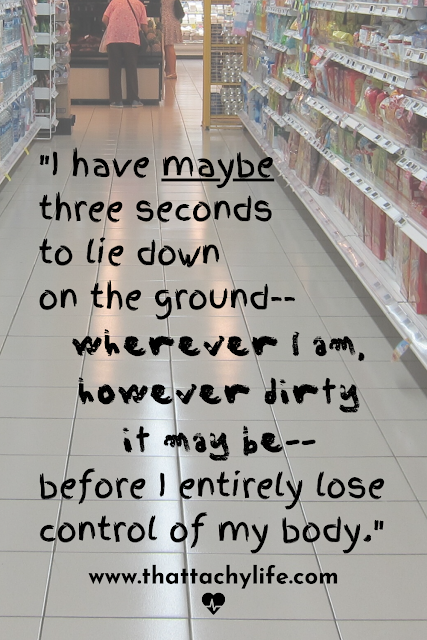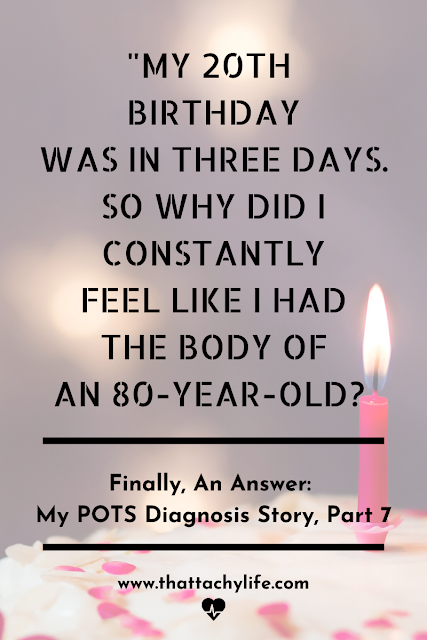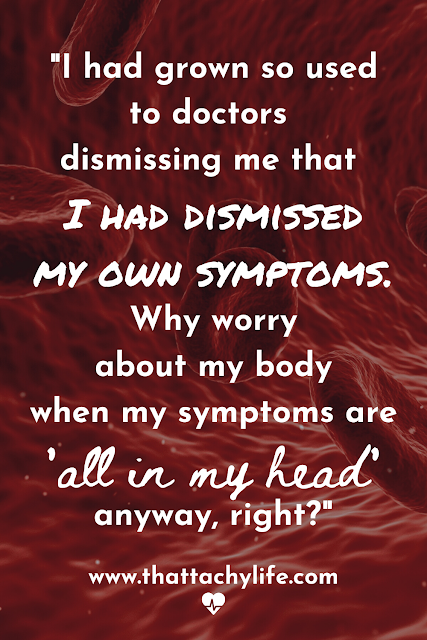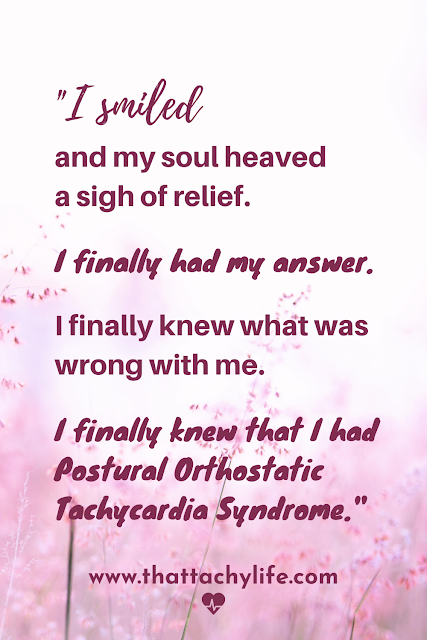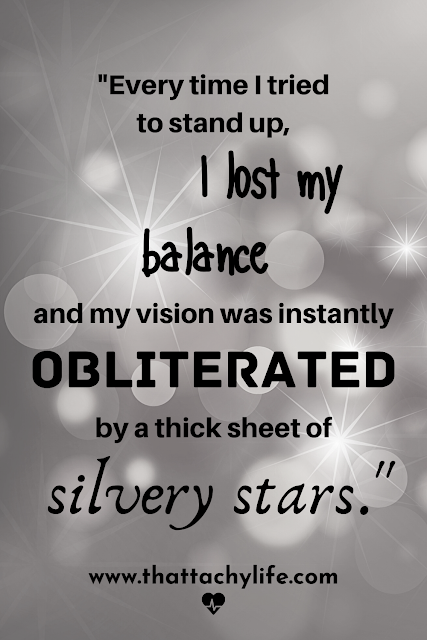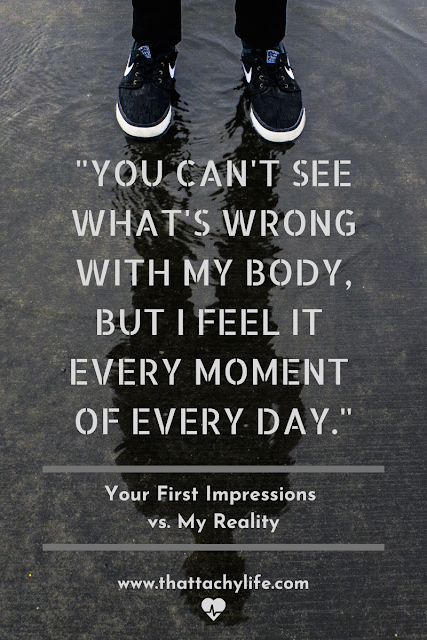To many people, I look like just a normal college-aged kid. That is, until I'm passed out on the floor.
That's when the people around me suddenly realize... I'm different. My body is different.
The thing that makes me different is called POTS. Postural Orthostatic Tachycardia Syndrome is a complicated health condition (and I'm by no means a doctor), but I'm gonna take a stab here at explaining POTS-- to the best of my understanding and experience-- for those of you who are genuinely curious about how my body works.
Postural: Basically, My Body is Allergic to Gravity
Just chillin' on the couch? I'm fine.
But as soon as I change my posture (thus the term postural) and stand up, gravity happens. And gravity is a powerful force.
But as soon as I change my posture (thus the term postural) and stand up, gravity happens. And gravity is a powerful force.
But the human body is stronger than gravity! The way things NORMALLY work in response to standing up is that your heart rate temporarily increases by 10-15 beats per minute. This is to counteract a small drop in blood pressure caused by the increased gravitational pull of standing. But this raise in heart rate is short-lived. Your body's long-term response to standing upright is to tighten up its blood vessels (particularly the ones in your legs) to help compensate for the increased pull of gravity on your blood.
Then as soon as your blood vessels constrict (which normally happens within 30-60 seconds of standing up), your heart can return to normal and continue happily pumping blood to every part of the body just like it was before. And life goes on and everybody is happy, because every organ in your body is getting their fair share of blood (and oxygen and nutrients and all that other good stuff carried in your blood).
This is how a healthy person's body works. With the help of chemical messengers, your autonomic nervous system regulates much of this process. You don't even have to think about vasoconstriction when you stand up... it just happens. Your body contains built-in protection against the force of gravity which pulls on your blood.
Then as soon as your blood vessels constrict (which normally happens within 30-60 seconds of standing up), your heart can return to normal and continue happily pumping blood to every part of the body just like it was before. And life goes on and everybody is happy, because every organ in your body is getting their fair share of blood (and oxygen and nutrients and all that other good stuff carried in your blood).
This is how a healthy person's body works. With the help of chemical messengers, your autonomic nervous system regulates much of this process. You don't even have to think about vasoconstriction when you stand up... it just happens. Your body contains built-in protection against the force of gravity which pulls on your blood.
But a body with POTS tells a different story. Somewhere, somehow, my autonomic nervous system got damaged. So now, when I stand up, my body doesn't compensate correctly. The chemicals that are supposed to trigger constriction of my blood vessels don't get released. So guess what happens? Gravity wins. My blood sinks toward the earth unchecked. And my body starts to freak out.
Orthostatic: The Longer I Stand Still, the Worse it Gets
When I don't have the option to sit or lie down, I do the next best thing: I move.
Even (or especially) when I'm stuck standing in the middle of a super important conversation, my toes are always wiggling inside my shoes. I've learned to surreptitiously squeeze and release my calf and thigh muscles as I talk. And I shift my weight back and forth between my heels and my toes and from one foot to the other as I wait out the conversation.
Even (or especially) when I'm stuck standing in the middle of a super important conversation, my toes are always wiggling inside my shoes. I've learned to surreptitiously squeeze and release my calf and thigh muscles as I talk. And I shift my weight back and forth between my heels and my toes and from one foot to the other as I wait out the conversation.
All this moving of my skeletal muscles is a desperate attempt to keep blood from pooling in my legs. When my skeletal muscles contract, they squeeze the adjacent blood veins and encourage blood to return to my heart.
But moving around can only mitigate my symptoms for so long. Even with the help of my legs' skeletal muscles, the organs in my body don't get enough blood to function properly.
Especially my brain. Since my brain is at the top of my body (and my blood is pooled at the bottom), it often suffers the most. "Brain fog" is my everyday existence; basically, I literally cannot think on my feet.
If I'm standing up, then my brain is not getting fed enough blood to formulate clear thoughts. Everything is jumbled and I lose the ability make sense of the world around me. I have to claw through a thick fog in my mind just to string voices together enough to understand if someone is talking to me. So if you feel tempted to give me a pop quiz in this state... don't. Based on my answers, you'd probably wonder how I ever graduated from kindergarten.
If I'm standing up, then my brain is not getting fed enough blood to formulate clear thoughts. Everything is jumbled and I lose the ability make sense of the world around me. I have to claw through a thick fog in my mind just to string voices together enough to understand if someone is talking to me. So if you feel tempted to give me a pop quiz in this state... don't. Based on my answers, you'd probably wonder how I ever graduated from kindergarten.
Now I want you to understand: If I lie down, everything will be fine. Within a few seconds, my blood will happily flow back to my heart and head (especially if I prop my legs up a bit), and all my organs will be happy. By the end of a few minutes, I will feel like a normal girl again who can totally ace a college-level pop quiz.
But if I don't lie down, my body will begin to shut down. My hands start shaking. My limbs go weak. My vision gets blurry and goes completely dark. And I have maybe three seconds to lie down on the ground-- wherever I am, however dirty it may be-- before I entirely lose control of my body. (Many POTS patients completely faint at this point, while others only experience a crippling sense of near-syncope. I experience near-syncope and then end up in a conscious, limp paralysis until my body is able to recover from the shock of being upright.)
Tachycardia: My Heart Can't Stop Working Overtime
Tachycardia is the medical term for a fast heart rate. This is the most iconic symptom of POTS, especially when standing upright. A POTS diagnosis requires an increased heart rate of at least 30 beats per minute (40 bpm for children) within 10 minutes of standing up from a lying position.
But those numbers are just the minimum. My heart often jumps from 60-65 bpm while lying down to 130-140 bpm while standing. That's an increase of 65-80 beats per minute, just from a simple postural change. My heart rate doubles every time I stand up. I don't have to go for a run to get exercise; my cardio workout for the day is just standing up.
But those numbers are just the minimum. My heart often jumps from 60-65 bpm while lying down to 130-140 bpm while standing. That's an increase of 65-80 beats per minute, just from a simple postural change. My heart rate doubles every time I stand up. I don't have to go for a run to get exercise; my cardio workout for the day is just standing up.
But why? Why does my heart hammer like a woodpecker every time I stand up? The gist of it is that my heart knows something is wrong. And that poor little heart is trying as hard as he can to fix the problem.
As soon as they realize they aren't getting fed the nutrients they need, all the organs in my body start screaming at my heart to DO SOMETHING about the blood shortage. So my heart does the only thing he can think of: he beats faster. Maybe, just maybe, if my heart can pump hard enough and fast enough, he can send the blood that is pooling in my legs back up to my brain where it is so desperately needed.
As soon as they realize they aren't getting fed the nutrients they need, all the organs in my body start screaming at my heart to DO SOMETHING about the blood shortage. So my heart does the only thing he can think of: he beats faster. Maybe, just maybe, if my heart can pump hard enough and fast enough, he can send the blood that is pooling in my legs back up to my brain where it is so desperately needed.
But it doesn't work. No increase of heart rate can substitute for the power of vasoconstriction. My heart is able (just barely) to keep me conscious, but that's all. The power of gravity is too strong for the poor little guy to overcome.
But my heart is valiant and stubborn. He doesn't give up. So he keeps desperately pounding away, hoping that one day his efforts will amount to something.
(And yes, I do realize I just personified my heart in the last few paragraphs. It's about time, honestly... he does do a lot of work for me. I think I'll name him Fred. What do you think?)
Syndrome: Oh Honey, This is Just the Beginning...
POTS syndrome is classified as a dysfunction of the autonomic nervous system. Therefore the condition is termed a dysautonomia. And since my autonomic nervous system controls much, much more than just my heart rate, I feel the effects of POTS in many areas of my body.
If I were to fully describe every one of my symptoms, this blog post would never end. That's why this medical condition is called a syndrome: POTS is a collection of symptoms, not just one symptom. This is also what makes POTS confusing and hard to diagnose, because it shares symptoms with many other medical conditions. And every POTS patient experiences a different combination of symptoms to varying degrees.
Here are the symptoms (besides the ever-annoying tachycardia) that I notice every single day:
If I were to fully describe every one of my symptoms, this blog post would never end. That's why this medical condition is called a syndrome: POTS is a collection of symptoms, not just one symptom. This is also what makes POTS confusing and hard to diagnose, because it shares symptoms with many other medical conditions. And every POTS patient experiences a different combination of symptoms to varying degrees.
Here are the symptoms (besides the ever-annoying tachycardia) that I notice every single day:
Fatigue. Unending, eternal fatigue. This is absolutely #1 on my list of symptoms. When I say the words "I'm tired", I don't mean that I need a 30-minute nap and then I'll feel fine. I'm trying to somehow express that I am utterly, completely, totally drained of every. single. ounce. of energy that I ever dreamed of in my entire life. If you somehow think I have energy... I promise you, I'm faking.
Hypersensitivity, Headaches, and Brain Fog. The world is often too bright, too loud, and too exciting for me. My nervous system can't handle auditory and visual stimulation very well. Best case, I get a nagging headache. Worst case, my body shuts down and I wind up stuck in a conscious-but-paralyzed POTS seizure.
Lightheadedness and Vision Abnormalities. Every single time I stand up (and other random times when I'm doing nothing at all), my vision goes black for a few seconds and I feel weightless-- like I'm floating. Then my vision slowly comes back just enough to see hundreds of glittery stars winking back at me. At some point too I usually lose my balance and have to grip the wall until the stars go away and my vision returns to normal. (I honestly used to think this happened to everyone... then I learned that experiencing near-syncope multiple times every day isn't actually supposed to be a normal everyday activity!)
Wacky Body Temperature. I am always FREEZING cold, especially my fingers and toes. I can never get warm enough. My fingers often physically hurt because they feel like ice cubes. Just for fun, sometimes I'll slip my fingers behind my boyfriend's shirt collar so I can watch him shrink away from my snow-queen touch. But then when my boyfriend turns around and hugs me, he complains that I am as hot as a furnace. My blood circulation is just so poor that my raging body heat doesn't spread out to my fingers and toes.
Exercise Intolerance. I used to jog for fun when I was in junior high. I absolutely loved the satisfaction of a good workout, and I was working my way up to running a 5K seamlessly. But the last time I tried to go for run (two years ago, a week before my POTS syndrome hit in full force), I didn't get far before I found myself curled up on the ground crying in pain. My ears were ringing, shrieking at me. I held my head in my hands, expecting it to burst any moment from the overwhelming pressure inside. My heart was in my mouth and pounding harder than I ever thought possible. My stomach was sick and I couldn't breathe. I tried to drink water, but it only made the waves of nausea hit me harder. And as I lay there on the ground crying and gasping for breath, I began to realize that my body had given up. My strength was gone. And my jogging days were over.
A few more issues relating to my POTS bother me at least a dozen times every month or so: Insomnia, Shakiness, Chest Pain, Excessive Sweating, Nausea, and Gastrointestinal Issues.
I also used to regularly experience conscious-but-paralyzed non-epileptic POTS seizures as well, but now that I am on the right blood pressure medication I have not experienced a seizure for over a year now. And I praise God for that, because those were definitely NOT fun!
_________________________________________
For more information about POTS:
POTS Visualized in a Short Video by Dysautonomia International
20 Signs You Might Have POTS from The Mighty
Cleveland Clinic's POTS Management Manual
Colorful Data from a POTS Survey Conducted by MyHeart.net
10 Facts About POTS from Dysautonomia International
A Detailed Explanation of POTS from Johns Hopkins Medicine
_________________________________________
For more information about POTS:
POTS Visualized in a Short Video by Dysautonomia International
20 Signs You Might Have POTS from The Mighty
Cleveland Clinic's POTS Management Manual
Colorful Data from a POTS Survey Conducted by MyHeart.net
10 Facts About POTS from Dysautonomia International
A Detailed Explanation of POTS from Johns Hopkins Medicine
_________________________________________
Hopefully this post comes across to you as informative and not just me complaining about all my woes. Sure, POTS is hard, and my body is weak. But I have Jesus Christ on my side. So when I am weak, I know that I can count on Him to give me strength. That's why, even though life is rough for me sometimes, I am determined to show Christ's love to others around me who are struggling too.
This week (or anytime), if you send me a message, I would love to pray for you as you battle the demons in your life. Let me know what I can pray for! :)
This week (or anytime), if you send me a message, I would love to pray for you as you battle the demons in your life. Let me know what I can pray for! :)
Stay strong. I'm praying for you.
Bonjé Gioja
P.S. If you're a POTSie, what are your worst symptoms? Or do you know someone who has POTS? Does my explanation make sense to you, or is POTS still a super confusing topic? (Don't worry, I'm still learning about it too!) Let me know your thoughts in the comments below.
P.P.S. Wanna subscribe to my blog posts? You can do that right here!



